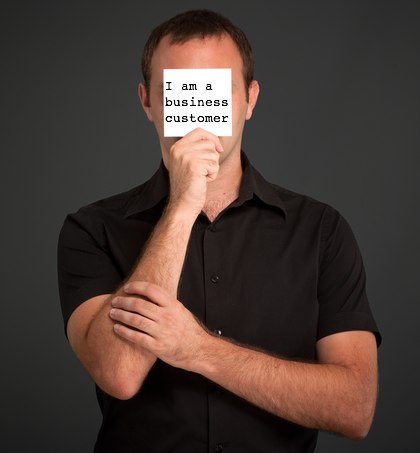
Source: Shutterstock (edited)
As some social media experts are now starting to realize, businesses need a little bit more than relationships to justify their spend in conversational marketing. Relationships are difficult to forge and even more burdensome to measure. And while participation and engagement are part of a more effective interactive business communications program now, we can not neglect our responsibilities to the bottom line as well as our dedication to existing customers and prospects.
Socialized media affects an organization in its entirety. Any division responsible for outside communication interaction, from marketing and public relations to sales and service, will eventually socialize – it’s a matter of when, not if.
I’m often asked if I can share experiences, examples, and strategies in business-to-business as most individuals asking the question observe the saturation of business-to-consumer examples populating the socialmediasphere today.
Honestly, much of the work I do is focused in the B2B realm. My experiences to date share similar philosophies, processes, and tactical programs with B2C programs, as almost everything begins with listening and observation. Identifying the new influencers, their reach, and surfacing their channels of influence and interaction are the benefits of research and documentation. The differences between B2C and B2B are represented specifically by the voices, communities, conversations, questions, interaction and their place within the buy and value cycles.
Everything comes into focus by reverse engineering who you need to reach, at what level, where they go for answers and direction, who do they look to for insight, and who are they connected to and why.
Perhaps one of the more understated benefits of social media in B2B is the ability to establish and foster expertise within a given industry or niche. The same tools and services that new influencers leverage to construct prominence and demonstrate awareness are also readily available to anyone with wisdom and vision to share.
I was once asked what it takes to become a thought leader. My answer was short and playfully sarcastic, “it starts with actually being a thought leader.” In all seriousness however, it’s true. Combining intelligence, prowess, experience, innovation, and inspiration into a series of targeted and distributed platforms that are shareable and discoverable by peers, customers, prospects and partners is how we earn mind share and eventually market share.
If you were to ask Charlene Li, Ray Wang, and Jeremiah Owyang of Altimeter Group, August Ray of Forrester, or Paul Greenberg author of CRM at the Speed of Light, I’m sure their views would align.
BtoB Magazine recently released its 2010 outlook, which predicts the rise of social media marketing in both importance and spend heading into the new year.
To get a deeper view at B2B social media marketing in 2010, eMarketer graphed the results…
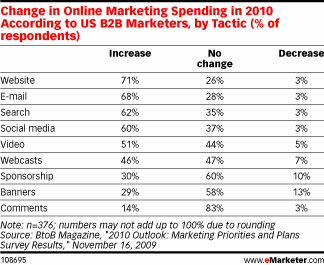
At the top of the list, Website spending is forecast to rise upwards of 71%. I believe that Websites in general, especially in B2B, should resemble the rapid evolution of the social web, as many social media and interactive marketing programs currently engage people in very dynamic communities only to send them to a static dead end.
B2B email and search marketing are also at the top of the list, increasing by 68% and 62% respectively.
Social Media rose to fourth with a dramatic increase of 60% heading into 2010. Surprisingly however, 37% of organizations reported no change in their Social Media efforts, with 3% actually reducing their programs. According to the report, 54% of respondents currently use social media for marketing, which represents a jump of 9% compared to November 2008.
It’s also worth noting that video will increase by an estimated 51%, which we can assume will have a role in social media marketing – as one can guess that a social network will be employed to host and share much of the custom content.
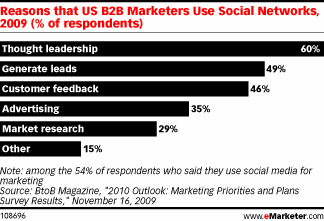
As mentioned earlier, establishing and conveying thought leadership is a valid and promising opportunity in social medial. 60% of polled B2B marketers reported that thought leadership was at the top of the list for reasons they would engage in social networks. Generating leads and customer feedback served as the second and third top motivators for participation with 49% and 46%.
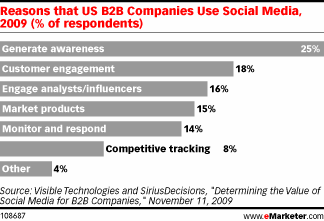
As eMarketer points out however, respondents to a different survey conducted by Visible Technologies and SiriusDecisions held differing priorities when it comes to Social Media marketing.
Generating awareness was at the top of the list with 25%, customer engagement followed with 18%, and engaging analysts and influencers ranked third with 16%. Marketing products and monitoring and responding trailed by only 1-2 points with 15% and 14% respectively. Although, one could argue that monitoring and responding and customer engagement are one in the same, which could theoretically send it to the top of the reasons.
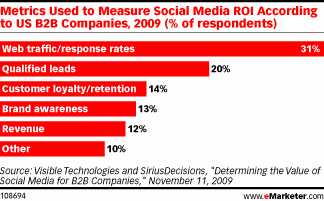
While many run away from the discussion of ROI and measurement, social media is among the most measurable forms of interactive marketing, assuming that you know how and why to employ it in the first place.
Of those surveyed, 31% measure Social Media ROI through Web traffic and response rates. Qualified leads, which to me represent a meaningful metric, are analyzed by 20%. In succession, customer loyalty ranked third with 15%, brand awareness followed with 13%, and perhaps most surprising, revenue accounted for only 12%. In B2B, the sell cycle is much longer than average transactions. Perhaps the extended evaluation process is accounted for in the lower deployment of revenue metrics.
In the end, the dynamics of business and the role of influence share similar attributes that significantly benefit from socialized media and active and informed engagement. We earn the business and relationships we deserve. This is, after all, just business.
Connect with Brian Solis on:
Twitter, LinkedIn, Tumblr, Plaxo, Posterous, or Facebook
—
Click the image below to buy the book/poster:
pr pr+2.0 pr2.0 public+relations marketing advertising interactive social+media socialmedia brian+solis social media media2.0 media+2.0 2.0 smo social+media+optimization marcom communication publicity advertising expert interactive spin brand branding guru social+architect



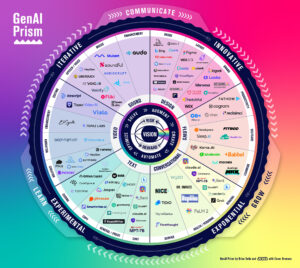



B2B companies can get MORE value out of using social media as part of their inbound marketing program than B2C companies often can get.
Why?
Well, usually most B2B sales are at much higher price points than B2C companies. So while a consumer company might only be able to invest a small amount ($10-50) of time and effort in attracting a new customer, a B2B company can often spend a much larger amount ($1000 or $10,000) in time & effort to attract a customer. And social media does require some time and personal attention, since the new expectation is personal connections and involvement. But, the B2B companies can afford to make a fair amount of investment in 1-1 relationships, far more than a consumer company can in any one relationship. And isn't social media about investing in relationships?
I am always shocked when B2B companies claim that social media is not used in B2B and cannot be useful for B2B marketing. We have found the opposite at HubSpot. We have 8,000 fans on Facebook, 40,000 members of our LinkedIn group, 24,000 followers on Twitter. We view social media and our blog as an important parts of our inbound marketing strategy, both our blog and our social media presence are in the top 5 sources of leads and sales for our business.
Mike, thank you for sharing. A case study and validation in the comments section makes this post a much more meaningful experience for those who visit…
Great Point Mike its still a confusion in the minds of B2B brand champs that social media does not work.The major reason for that being in both B2B and B2C strategies something which is considered of prime importance is sales stats, while using social media B2C companies don't loose interest readily because there sales anyways come from interaction with there consumers and they can do this in a real good manner here so they know they can achieve the right kind of revenue but on the other hand as B2B guys are far away from the people they are looking to speak with thus they end up saying its a fad.
So the ideal B2B strategy has to follow the norms of social media and connect with there audience and if you have the right social impressions you can easily convert leads into sales.
Thanks Brian, for igniting the topic.
Great post Brian! I'm curious what B2B companies readers think are doing really well with social media?
Brian,
You're correct in what you've presented. What I didn't see was the word “integration” when it comes to social media. We've found that unless it is integrated into a comprehensive marketing communications effort (as apposed to an add-on service) it is doomed to failure.
Completely agree with Curt on this one. You have to effectively integrate social media into everything you do. If you silo it as a separate project or entity, you truly have just doomed it to failure.
Seconding Robert here, this is an important point. There are any number of ways to gain a positive feedback look between traditional and social media efforts in B2B that make getting the positive ROI a lot more likely. That was the topic of my last blog post: http://bit.ly/63I0YK
Enjoyed your post. Glad to hear others are seeing the light!
great post! goes to show how concerned large B2B brands are about their “social clout,” they are finally recognizing the power of social media (for good or bad) and are beginning to invest heavily in 2.0 pr. I would like to see a more indepth industry break down… ie technolgy, financial services, manufacturing etc.
Great post as always Brian. I'm in the middle of SM/B2B strategy assessment right now. One of my challenges is pitching measurability of my ideas and the metric priority for what would make it successful according to SM vs. actual revenue. As a marketer, I know the value of good marketing/SM isn't always direct revenue, but a corporate culture of pragmatism doesn't always lend itself being open, at least right away, to switching the gears of exploration when their B2B has always been their bread and butter.
Great Post.
Nice post, Brian. Thanks for all the info. I really liked your take on thought leaders and I completely agree. I'd even add that to be a thought leader, you also have to be willing to share valuable information without trying to sell (but trusting that your boost in reputation will translate to more sales). –Coreen
I really like the point you made about socialized media affecting the whole organization. Often SM gets pigeon-holed as a Marketing, PR, or Customer Service initiative. True socialization of the entire organization opens up the pipeline for insights and feedback to come through from perhaps unlikely sources, even directed at an unlikely audience. 'That's not my job' doesn't fly – I think it's everyone's job to pay attention to the market. That includes listening to what's happening in the social space and acting on those insights.
Thanks for the great thought leadership Brian!
Your 'thought leader' point cannot be emphasized enough.
The term 'content' gets thrown around a lot in B2B social media and demand generation marketing, to the point where it has become very flat. Really, what attracts, engages, and nurtures a relationship with a prospect is the appeal of your legitimate knowledge and expertise that they perceive as valuable. How you package and share that knowledge in large part determines how successful you are at creating and sustaining customer relationships.
Content can be good or bad…and so goes content marketing. Knowledge has inherent value, so if you focus your efforts and resources on creating sustaining customer relationships by leveraging what you know and sharing with those who value what you know, being perceived as a “thought leader” by those that matter to your business will be a natural by-product.
If you haven't seen it already, you may be interested in Business.com's 2009 B2B Social Media Benchmarking Study which shows that B2B companies are typically more engaged in social media than their B2C counterparts. While some have been surprised with this, those of us in B2B marketing know that the very nature of doing business in the B2B landscape is largely about networking and being social. That is because building long-term business relationships is so important to the success of a B2B business.
B2B has been doing social media before it was even being called social media. We just have new channels from which to engage and better tools with which to listen with now.
Thanks for mentioning the study, Robert. For those interested, Business.com's B2B Social Media Benchmarking study is available at http://www.business.com/info/b2b-social-media-b….
Brian,
Thanks for bringing up the subject of B2B social media. I agree with Mike's comment that B2B companies have a bigger up side when it comes to social media. We have seen a thirst for information on our blog and have researched many successful case studies outside of the traditional B2B tech space.
We need thought leadership in the B2B social media space to help companies understand online metrics and teach them how social media can be connected to the sales funnel. This will allow for better ROI measurement and also optimization of budget in a tough economy. Even the recent Facebook privacy changes and Google's real-time search will have major impacts on social CRM and inbound marketing respectively for B2B.
Thanks for sharing your insights on this issue Brian.
Kipp Bodnar
http://SocialMediaB2B.com
Terrific article, Brian! It seems obvious, but the opportunities to expand and enhance your B2B image thru social networking is an important tool for developing your brand. Thanks!
Great post here. I like the section where you provide the Metrics used to Measure Social Media ROI According to US B2B Companies. I guess because 31% of companies measure social media through web traffic, 71% of companies surveyed will increase their spending on websites.
A very relevant post as more B2B companies get into social media. We've been using social media at the exchange since mid-2007 (Facebook, LinkedIn, Delicious, Digg) simply because we could see the surge of traders who were using it. I think people confuse B2B's use of social media with comparing it so much to B2C. The best source that drove our strategy was Groundswell — it all starts with people. Are the people you want to reach on Twitter? LinkedIn? Facebook? YouTube? Other services? We use Twiter (@CMEGroup) because that's where a lot of our customers are today (via StockTwits.com). People tend to think they need to chase the latest and greatest object (e.g. Foursquare) that they tend to forget platforms that work well (e.g. LinkedIn). The other point that some have pointed out is that this should be a part of your existing brand program – it is not a silver bullet to communicating with your audiences.
Thanks for including our (SiriusDecisions) data among your excellent points. The reason we broke out the categories of customer engagement and monitor/respond is that a significant number of B2B organizations report that they are actively engaging (whatever that means to them) with their customers in the social universe but they're not necessarily using tools (automated or manual) to monitor what these customers are saying about them.
It's refreshing to see you call out the factor that B2B sales cycles can be long and complex. This helps account for the fact that I don't see revenue used as an accurate metric too much (yet) since few B2B organizations have gone through enough sales cycles (or even one) using social media in the marketing mix to have enough data to determine what the impact was; certainly not beyond the top of the funnel. This also assumes that organizations have enough insight into, and data about, their marketing and sales process to understand what programs/tactics had an impact on a buyer's decision, including social media. Obviously, this will have to change.
With our organization much of the increase in expense associated with social media for b2b can be attributed directly to content development, monitoring and staffing. While the delivery mechanisms are free; twitter, facebook, youtube, etc., the management of what goes into the tools is not. Further, once an organization commits, there is no going back. The community comes to rely on a level of service. As the community scales, the expense can follow. To help justify beyond NPS, I recommend goals around Engagement, SEO and Revenue. Thus far, the benefits far outweigh the expenses.
Thanks for the great post.
All the best,
@davidbaeza
Thanks for your statistic that “video will increase by an estimated 51%”. I'm working with a client now that makes videos and infomercials for sports products. They have not used any, that's right, not any, social media platforms to market their products and videos. They have posted them on their website and that's it. No promotion, no nothing. It has taken them quite some time to believe me that it will help their bottom line. Although they are a very successful company this next phase of actually promoting the videos should take them over the top. I can't wait to tell them your little 51% statistic. Thanks!
I appreciate your straight-forward statement that you need to BE a thought leader to become one. True thought leadership be based on the strategy and requires strong leadership – why, because the entire personnel delivers the expertise and promise. When built from a solid basis, it will bring you awareness and credibility – therefore I don't see a disconnect between the two surveys, where in the one companies aim at thought leadership and in the other at awareness and engagement.
I've spent a lot of time on this topic which is a great opportunity for small growth companies. Last spring I published a book on my experiences called “Sustainable thought leadership – building awareness and credibility to support business”. My view has been on the strategic and leadership perspectives – now it's great to see what social media offers for the process. Thanks for the learnings!
Social media is turning Business-To-Business in Person-To-Person. We're in the middle of the shift.
Brian,
Thank you, thank you, thank you! As one who is currently up for a position handling social media in a B2B setting, this information is both timely and extremely helpful to me. And I agree with some of your commenters that say “integration” is important. SM has to be aligned with either a marketing strategy or corporate messaging to truly be effective.
Thanks again,
Jeremy Fischer
http://www.rebirthofpr.com
Very interesting stats, I was personally surprised to see that video marketing was only 5th on the list of increases, however it was 51% so that does say something.
I find that corporations seem to be slowly groking social media benefits while smaller and localized businesses lag behind. This is ironic since these companies are positioned to claim a significant strategic advantage by using interactive tools offered by social media.
Local businesses that have been successful using social channels have focused on using them as they were intended – to share interesting and valuable communications. Like:a local pizza restaurant that twitter specials and new toppings, an auto repair show that posts up to the minute traffic jams, or even simple local boutique that shares local events, whos who and other juicy tidbets. Having a smaller twitter list or facebook following is ok because it is about communicating with the right people at the right time. Its also about being part of the local community – while online. Local internet marketing online is indeed alot like netowrking offline – it takes time, energy, personal involvement and commitment.
Like Mike V mentioned – I agree that multiple personal touch points (social media) help B2B especially with higher price points. I think of it as "word of mouth texting" marketing.
The real issue is track-ability, it is so fuzzy and so far does not lend itself to simple measurements. (sounds like real life doesn't it?)
Great comments and post
I agree in social media, it's not just business. it's business to business. Many B2B companies are using social media to promote their brands effectively and they are getting good results. Thanks for sharing nice info 🙂
I agree in social media, it's not just business. it's business to business. Many B2B companies are using social media to promote their brands effectively and they are getting good results. Thanks for sharing nice info 🙂
There was a lot of thought-provoking information in your position, as always (thank you for such well-considered content). One sentence that particularly spoke to me was this: “Combining intelligence, prowess, experience, innovation, and inspiration into a series of targeted and distributed platforms that are shareable and discoverable by peers, customers, prospects and partners is how we earn mind share and eventually market share.”
For those skeptical or self-serving poseur organizations, that statement alone should get them to re-examine their preparedness and strategic pursuit of socialized business. There's nothing free or turn-key about realigning business process, infusing comprehensive new thinking to drive decision-making, or relinquishing control in the interest of pursuing transparency (which comes with a higher degree of accountability, I believe).
And inevitably, you're skimming the recommendation that marketers go where their flock are, tending to them in their dispersed areas of rest and comfort. This approach is a radical shift from driving the flock to the farm for mass collection.